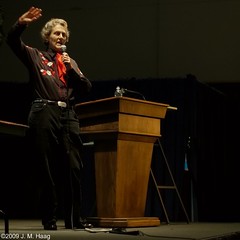



 
Temple Grandin
by Cynthia Parkhill — Focus Pages Editor
The 2010 TIME 100 poll includes Temple Grandin among its nominees for the world’s most influential people. Diagnosed with autism when she was a young child, Grandin, 62, is a professor of animal science, an author and speaker.
Grandin has a unique perspective as a person on the autism continuum. She relates the qualities that give her insight into the fears and perspectives of animals in her book, “Animals in Translation.”
I shared radio time with Grandin nearly one year ago. I sat in the KPFZ studio with show host Chloe Carl during an episode of Earthwise and Grandin joined us via long-distance telephone. I also read many of Grandin’s books, such as “Thinking in Pictures.”
Grandin credits her mother’s influence upon her success today. Her mother refused to give up on Grandin; she rejected the suggestion that Grandin be placed in an institution. Grandin’s mother made clear that good manners were expected at all times. Her mother also used turn-taking games to help Grandin learn social skills.
You can learn more in a book Grandin has co-authored with Sean Barron: “The Unwritten Rules of Social Relationships.”
Grandin is inspirational to me, because I see many similarities among circumstances in our lives. Absent only a formal diagnosis, I faced similar challenges with teasing and ridicule at school. Like Grandin, my earliest successful relationships involved a common interest: horseback riding for Grandin and medieval reenactment for me.
Grandin and I also share a concern that an autism diagnosis should not lead to diminished expectations for a person’s capability.
I harbor feelings of anger and resentment that when I was going to school, my difference was not understood. Autism diagnoses in the United States were subject to very rigidly-defined criteria until the mid- to late-1990s. By then, I’d already left high school and had additionally graduated from Sonoma State University.
I see children today receiving individualized support; I see bullying addressed proactively in school policy, at least.
My former school district, Calistoga Joint Unified, accepted a $3,200 donation from Cody Kirkham for Challenge Day at Calistoga Junior/Senior High School. The CHS drama department presented a performance of “Bang, Bang You’re Dead.” That told me that bullying was at last being acknowledged in my former schools.
At the same time, I wonder, if some of this support had been in place for me, would I have turned out differently? At a minimum, I would have missed the revelation at age 39 that there were others like me in the world. I may also have risked being influenced by other people’s beliefs about what I could or could not achieve.
I think it is important, however, to raise the profile of adults on the spectrum. The most recent statistics claim that autism affects one in 94 children. Much less is said about these children’s grown counterparts and any services they may need.
Children with autism don’t just disappear, to paraphrase an observation in Oliver Sacks’ “An Anthropologist on Mars.” “In a strange way,” he writes, “most people speak only of autistic children and never of autistic adults, as if the children somehow just vanished from the earth.”
As an adult who learned as an adult that I am on the autism spectrum, I am not entirely familiar with what resources are available to me; I do know, however, that I’ll have to research and secure them for myself if they seem appropriate.
There are no reparations for me if I should ever need support, because the school district’s responsibility to me ended when I turned 21.
But to see Grandin in the TIME 100 poll, to read her books and hear her speak is a reminder that there are adults on the autism continuum. People who may be trying to make sense of an autism diagnosis for themselves or for someone they love can look at Grandin and see possibilities.
Facebook groups are encouraging votes for Grandin in the 2010 TIME 100 poll. To view the poll and rank its nominees, go to http://www.time.com/time/specials . Viewers are asked to assign importance to nominees on a scale between zero and 100. The final list will be revealed on April 29.
Leave a Reply

